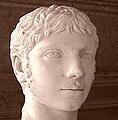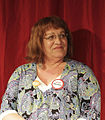Portal:Transgender
Welcome to the Transgender portal Being transgender is distinct from sexual orientation, and transgender people may identify as heterosexual (straight), homosexual (gay or lesbian), bisexual, asexual, or otherwise, or may decline to label their sexual orientation. The opposite of transgender is cisgender, which describes persons whose gender identity matches their assigned sex. Accurate statistics on the number of transgender people vary widely, in part due to different definitions of what constitutes being transgender. Some countries, such as Canada, collect census data on transgender people. Generally, fewer than 1% of the worldwide population are transgender, with figures ranging from <0.1% to 0.6%. Many transgender people experience gender dysphoria, and some seek medical treatments such as hormone replacement therapy, gender-affirming surgery, or psychotherapy. Not all transgender people desire these treatments, and some cannot undergo them for financial or medical reasons. The legal status of transgender people varies by jurisdiction. Many transgender people experience transphobia, or violence or discrimination towards transgender people, in the workplace, in accessing public accommodations, and in healthcare. In many places, they are not legally protected from discrimination. Several cultural events are held to celebrate the awareness of transgender people, including Transgender Day of Remembrance and International Transgender Day of Visibility, and the transgender flag is a common transgender pride symbol. (Full article...) Selected articleFierce Femmes and Notorious Liars: A Dangerous Trans Girl's Confabulous Memoir is a 2016 Canadian book by Kai Cheng Thom. A surrealist novel, it follows an unnamed transgender woman protagonist who leaves home at a young age to live on the Street of Miracles—where various sex work takes place—with other "femmes" (trans women). After one of them is killed, others form a gang and begin to attack men on the street. Thom aimed not to write a traditional transgender memoir targeted at explaining transgender issues to cisgender people, but to write the book that would have helped her as a transgender teenager. Characters are based on people from her life, as are plot points, but they are exaggerated and made surrealist. Two metaphors, those of killer bees living inside her and a Ghost Friend which can make her orgasm, represent after-effects of traumatic abuse. The novel garnered critical praise and was a finalist for Transgender Fiction at the 29th Lambda Literary Awards. It experienced a resurgence of attention when Emma Watson chose it for her feminist book club, Our Shared Shelf, in 2019. Selected biography Leelah Alcorn (November 15, 1997 – December 28, 2014) was an American transgender girl whose suicide attracted international attention. Alcorn had posted a suicide note to her Tumblr blog, writing about societal standards affecting transgender people and expressing the hope that her death would create a dialogue about discrimination, abuse and lack of support for transgender people. Assigned male at birth, she was given the name Joshua Alcorn and raised in Ohio by a family affiliated with the Churches of Christ movement. At age 14, she came out as transgender to her parents, Carla and Doug Alcorn, who refused to accept her female gender identity. When she was 16, they denied her request to undergo transition treatment, instead sending her to Christian-based conversion therapy with the intention of convincing her to reject her gender identity and accept her gender as assigned at birth. After she revealed her attraction toward males to her classmates, her parents removed her from school and revoked her access to social media. In her suicide note, Alcorn cited loneliness and alienation as key reasons for her decision to end her life and blamed her parents for causing these feelings. She killed herself by walking into traffic on the Interstate 71 highway. Alcorn arranged for her suicide note to be posted online several hours after her death, and it soon attracted international attention across mainstream and social media. LGBT rights activists called attention to the incident as evidence of the problems faced by transgender youth, while vigils were held in her memory in the United States and United Kingdom. Petitions were formed calling for the establishment of "Leelah's Law", a ban on conversion therapy in the U.S., which received a supportive response from U.S. President Barack Obama. Within a year, the city of Cincinnati criminalised conversion therapy. Alcorn's parents were criticized for misgendering Leelah in comments that they made to the media, while LGBT rights activist Dan Savage blamed them for their child's death, and social media users subjected them to online harassment. Alcorn's parents defended their refusal to accept their child's identity and their use of conversion therapy by reference to their Christian values. Did you know (auto-generated) -
This month's birthdays
More did you know...
Random quoteI may have a beard, and manly limbs and body, yet confined by these, I am and remain a woman. Related portalsSelected picturesTopics
CategoriesWikiProjects WikiProjects are non-hierarchical peer-run groups which serve as a resource for the communication on, and collaboration of, content within a specific topic area. Related WikiProjects: Things you can do
Associated WikimediaThe following Wikimedia Foundation sister projects provide more on this subject:
|





























